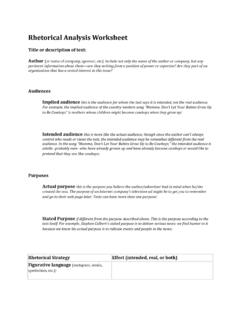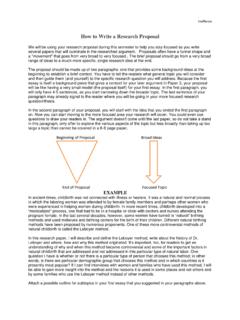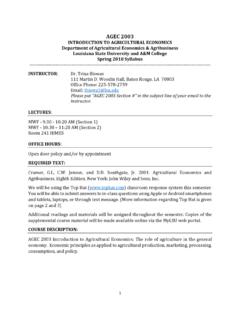Transcription of CORE BEHAVIOR EXPECTATIONS FOR SUPERVISORS
1 CORE BEHAVIOR EXPECTATIONS FOR SUPERVISORS REVISED: 6/17/2014 1 DELIVERING RESULTS SUBCOMPETENCIES BEHAVIOR EXPECTATIONS Productivity/ Efficiency Time Management Meeting Deadlines a) Time Management: Manages workload; demonstrates ability to prioritize assignments by meeting routine and unexpected deadlines; handles multiple tasks and deadlines. b) Productivity/Efficiency: Uses work time effectively; avoids excessive talking, multiple personal phone calls, and internet surfing; keeps appointments on time; responds to external and internal customers (returns phone calls and emails) in a timely manner; uses and implements automation and re-engineering to improve efficiency and efficacy. c) Meeting Deadlines: Demonstrates ability to delegate effectively to meet deadlines and develop staff; creates control and follow-up procedures to see projects to completion; overcomes obstacles and roadblocks; commits fully to the job and deadlines; concentrates on outcomes; eliminates unnecessary work to achieve results.
2 PROBLEM SOLVING SUBCOMPETENCIES BEHAVIOR EXPECTATIONS Flexibility and Adaptability Decision Making Innovation/ Future Oriented Critical Thinking Change Management a) Flexible and Adaptable: Promotes need for change and adaptability; adapts to change quickly shortening response time of all processes and systems; leads team through changing institutional demands and transitions in new business processes; implements change and applies process improvement changes. b) Decision Making: Considers university and department mission and values when making decisions; encourages participative decision making; solicits input, ideas and expertise of others; explains reasoning behind decisions to staff; accurately determines appropriate level of authority for each decision/action. c) Innovation/ Future Oriented: Encourages innovation and technology; challenges conventional thinking; actively seeks, acquires and applies new knowledge, skills and use of technology; initiates actions to avoid potential problems before they occur.
3 D) Critical Thinking: Identifies opportunities to reduce costs, improve customer service, increase productivity, and increase customer satisfaction; anticipates internal and external forces that will impact future effectiveness and efficiency of the unit and responds with needed change; mentors subordinates by providing feedback and insight on problem solving and offering potential solutions. e) Change Management: Manages effectively in a climate of uncertainty and ambiguity; operates with a clear sense of vision, mission and priorities; communicates needs for change and manages implementation process by obtaining buy-in from staff; communicates changes with openness and honesty. COMMUNICATION SUBCOMPETENCIES BEHAVIOR EXPECTATIONS Oral, Written, Non-Verbal Communication Interpersonal Skills Active Listening a) Oral, Written, Non-Verbal Communication: Possesses a solid writing ability demonstrating attention to grammar and spelling; communicates clearly, tactfully, and in a concise manner both verbally and in writing including responding to e-mail, voicemail and in meetings; when assigning tasks, communicates relevant instructions and connects it to organizational goals.
4 B) Interpersonal Skills: Maintains a credible image by displaying diplomacy and consistency; earns cooperation and respect from others; encourages positive interaction; demonstrates effective mediation and negotiation skills; appropriately handles own emotions; resolves conflict quickly to restore team effectiveness; steers conflict away from people and issues and towards agreement and solutions; demonstrates resilience, open mindedness and self-awareness. CORE BEHAVIOR EXPECTATIONS FOR SUPERVISORS REVISED: 6/17/2014 2 c) Active Listening: Listens to and considers the views of others; demonstrates appropriate empathy and understanding of message when listening; ability to paraphrase message to check for understanding; understands audience awareness and body language; avoids interrupting unnecessarily. COLLABORATION SUBCOMPETENCIES BEHAVIOR EXPECTATIONS Team/ Network Building Managing Diversity Information Sharing a) Team/ Network Building: Builds team spirit and promotes employee s accomplishments to others inside and outside the work group; works as a facilitator and coach, building cross-functional relationships and a shared sense of governance; works across departmental boundaries and avoids turf issues; exhibits brainstorming techniques and successfully collaborates in a team environment; builds internal and external partnerships to better accomplish goals; maintains good working relationships with co-workers, superiors and public; appreciates and leverages the skills and contributions of all employees; builds loyalty and commitment from team.
5 B) Diversity Management: Demonstrates ability to collaborate, manage, and motivate a diverse workgroup; promotes and effectively manages diversity; creates and encourages a work culture that embraces diversity; recruits for a diverse workplace ; develops, evaluates, and rewards employees consistent with the goal of creating a diverse workforce. c) Information Sharing: Shares information and keeps people up to date; willingness to share knowledge, experience, time and talents with others; disseminates needed information to staff in timely manner. SERVICE TO CUSTOMER AND LSU SUBCOMPETENCIES BEHAVIOR EXPECTATIONS Customer Focus Institutional Focus a) Customer Focus: Provides exceptional and responsive customer service to internal and external customers; resolves issues and assists employees and customers in timely, friendly and effective manner; assumes ownership of problems and avoids finger pointing allowing the customer to feel that their issue is understood and will be acted upon.
6 B) Institutional Focus: Directs unit resources and activities towards high value work, contributing directly to institutional mission and goals; supports, embodies and communicates LSU s mission of achieving the highest level of intellectual and personal development, application of knowledge and cultivation of the arts; effectively responds to the University s evolving needs and EXPECTATIONS ; represents the department and university in a professional manner to public (appropriate dress attire, respectful of others, maintains a positive attitude); understands how to balance needs and interests of one s own department with those interests of other departments and the University. INTEGRITY SUBCOMPETENCIES BEHAVIOR EXPECTATIONS Ethics Compliance in Policies and Procedures Attendance a) Ethics: Reaches decisions based on highest ethical standards; fosters a culture of trust and respect for others by behaving in a fair and ethical manner towards others; handles all sensitive issues ethically; avoids gossip.
7 B) Compliance: Understands and complies with laws and regulations that impact employees; institutes discipline and grievance handling policies and procedures in a fair and equitable manner; follows generally accepted standards and guidelines for profession/area of work; adheres to university and state standards of ethics and compliance; performs job duties in accordance with University policies and procedures, professional standards and practices, and in accordance to relevant laws, regulations and practices. CORE BEHAVIOR EXPECTATIONS FOR SUPERVISORS REVISED: 6/17/2014 3 c) Attendance: Maintains appropriate office hours; keeps tardiness and unplanned absences to a minimum. LEADING OTHERS SUBCOMPETENCIES BEHAVIORAL EXPECTATIONS Managing Diversity Developing Others Managing Performance a) Developing Others: Provides development opportunities to help employees diversify skills; identifies staff development needs and sets appropriate goals; formulates development plans; provides coaching, guidance, feedback and clarification of EXPECTATIONS ; offers additional training to staff.
8 B) Managing Performance: Ensures employees are trained, encouraged and held accountable for work performance; aligns performance goals to flagship agenda and department mission; analyzes length and difficulty of task/projects and establishes approach to achieving performance goals; assesses the impact of plans on performance results; plans and evaluates for performance in a timely manner; provides resources, incentives, and feedback; updates job descriptions regularly; recognizes and appreciates the contributions of effective staff performance.











